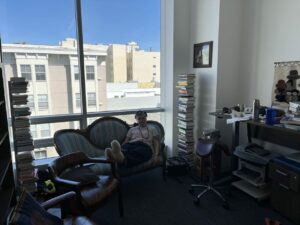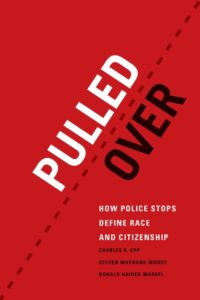
I spent the last week at the American Sociological Association’s annual meeting in Los Angeles. It’s a conference I rarely attend, because I far prefer intimate workshops to gigantic venues, but I was invited to be a discussant on a panel that interested me greatly titled Paying for Your Time: Economies of Displacement in the Criminal Legal System. Seven years ago, when my book Cheap on Crime came out, I attempted to bring together two literatures that seldom interact: Public choice economics, which predict that economic downturns will lead to decreased punishment capacity and thus to decreased punishment, and Marxist social history, which predicts that economic downturns lead to loss of legitimacy and thus to increased crackdown on, and oppression of, the poor. In Chapter 7 of the book I offer a third prediction: a shift in our perception of the subjects of the criminal justice system from wards of the state to burdens on the state’s budget. This can manifest in both benign and sinister ways. Benign, when our attention is drawn to aging and infirm people in prison and we start seriously consider the utility of their incarceration given the health care expenses involved; sinister, when we decide that the way for such folks to become less burdensome is to regard them as consumers and charge them for the “services” they receive. The three papers on the panel all examined this sinister mechanism and offered grim reminders of how low-level haggling over expenses and hounding people with these outrageous debts can and does ruin lives.
A classic, nefarious aspect of this is pay-to-stay, a scheme by which people are charged for their own incarceration as if they were paying for voluntary lodging. In Cheap on Crime I wryly observed that people in prison and jail don’t really have the funds to pay the exorbitant fees (pay-to-stay in the Riverside jail at the time I wrote the book, for example, amounted to $140 per night; in Fremont, it was $155) and that the next logical conclusion–a lien on their future earnings–would do wonders for their reentry prospects. Unfortunately, it turns out that I was right, and this absurd practice has just become more popular with time. In their paper Insult to Injury, April Fernandes, Brittany Friedman and Gabriela Kirk track the litigation efforts of states who chase people with disabilities after they get out of prison or jail and sue them to receive, in arrears, the “accommodation fees” for their prison stay, to the tune of tens of thousands of dollars that these people don’t have. The authors received, through FOIA requests, documentation in many such cases, and they show how physical and mental disabilities further complicate people’s ability to defend themselves against this outrage. In a heartbreaking presentation, they shared handwritten documents by pro-se defendants in these cases, who don’t understand why they are being persecuted and are not entitled to representation in these cases. I’m not surprised; I literally wrote the book about these schemes and I don’t understand either. I still vividly remember how shocked I was when I realized that courts have already examined the constitutionality of pay-to-stay and found it a-ok; seeing the real impact on real people was a shocker, and the futility of the exercise made me wonder whether states weren’t actually losing money on this litigation.
The second paper dealt with another top-down scheme aiming to fill municipal coffers: parking tickets. In a truly ingenious project, Kasey Hendricks and Ruben Ortiz triangulated all the parking tickets written up in the city of Chicago with the traffic regulations, weather reports, you name it, as well as neighborhood demographics and the identity of the ticket issuer (Shaw and McKay, the great criminological mappers of Chicago, would be very proud of this piece.) They discovered that more than 13% of the tickets were erroneous. They also discovered that mistakes in parking enforcement are often a function of the ticket issuer: cops don’t know parking regulations as well as parking officials, and because cops disproportionately write tickets in neighborhoods inhabited by undocumented immigrants, these folks bear the brunt of erroneous enforcement. Because not speaking English, and not wanting to voluntarily embroil oneself with the authorities, are both barriers to contesting tickets, erroneous enforcement proceeds.
The third paper, by Kate O’Neill, Tyler Smith, and Ian Kennedy, examined the extent to which incarceration based on low-level financial obligation and defaults has a gendered dynamic. They investigated which counties in Washington State rely on monetary sanctions such as fines and fees and examined the correlation between this reliance and women’s incarceration. Their reasoning behind this hypothesis (which their data support) is that women disproportionally live in poverty, and that women’s incarceration disproportionally relies on low-level financial violations. The connection between financial violations and incarceration is more complex than this: one driver of family disintegration is the criminalization of failure to pay child support (also a gendered thing) and women also disproportionately find themselves saddled with various financial obligations involving the incarcerated men in their lives, such as dealing with the bail bonds industry. But the question, “is this necessary?” permeated the conversation.
I had many thoughts to offer on these excellent papers, which revolve around three themes. The first, which I called “Blackstone wept,” had to do with the question whether the relatively new distinction between criminal and civil law still holds water in a world full of crimmigration, civil asset forfeiture, and §1983 lawsuits. Finding oneself as a civil defendant in these cases is just as daunting and soul-destroying as being a defendant in a criminal case, with the added complication of having no right to counsel and none of the due process guarantees from criminal procedure. It strengthens my view that the “Civil Gideon” initiative in San Francisco is essential, even as not doing these mean-spirited things in the first place would certainly be better.
My second thought had to do with the decreasing importance of the public-private divide. In a paper that got considerable attention at the time, I questioned the wisdom of focusing critical and reformist energy on the private prison industry, vile as it is. My thinking about this issue was shaped by three eye-opening days that I spent at a public choice economics workshop. While in the belly of that particular beast, I ate and drank at the expense of (I think) the Koch brothers and took in some libertarian perspectives on the government-versus-free-market debacle. I came to realize that the government is shaped by very similar savings-and-greed incentives to the ones of the private sector. To my workshop instructors, this was wonderful, and to me, it was horrible, but it was true nonetheless. Some of the worst atrocities of the prison system have been perpetrated in government facilities; the private prison industry hasn’t cornered the market on scrimping and saving at the expense of a minimal standard of living for its wards. That all these mean, insidious persecutions are perpetrated by local government has strengthened my belief that, if there’s a loophole that allows someone to make a quick buck at the expense of the basic humanity of someone else, it must be immediately closed, regardless of whether the Machiavellian party is a private entrepreneur or a government paper-pusher.
The third thought, and the one that really hits me in the gut, turns back to the utility of these persecutions. I honestly cannot imagine that it is a worthwhile, profitable exercise to hound people with mental disabilities for money they don’t have; to chase after tickets issued to people who do not speak English for nonexisting parking violations; or to pay for the incarceration of women who are not actually endangering public safety because of their failure to pay this or that fee. So what is the point of this cruelty? Or perhaps the cruelty is the point? And if so, it’s another reminder to my rabble-rousing friends that we must cultivate enough love in our hearts for two wars: the long-term dismantle-abolish-defund stuff we’re so fond of talking about, and the actual, short-term, emergency, person-to-person immediate help to combat this awfulness, which from a bird’s-eye view seems like small potatoes but can completely overwhelm and wreck someone’s life.
As an aside, the visit to Los Angeles was glorious, as I got to stay at the Los Angeles Athletic club, where I swam in their spectacular pool (lots of backstroke, so I could gaze at the chandelier!); chat with old and new friends about viewpoint diversity, how to encourage empowerment and resilience in our students, what religion means behind bars, etc.; enjoy the Academy Museum and the majestic Angkor exhibit at the California Science Center; take in jazz near the La Brea Tar Pits; and visit the atelier of one of my favorite designers, Jerry Jacob, the creative genius behind Ito888. I’ll be back, Angelenos!




No comment yet, add your voice below!